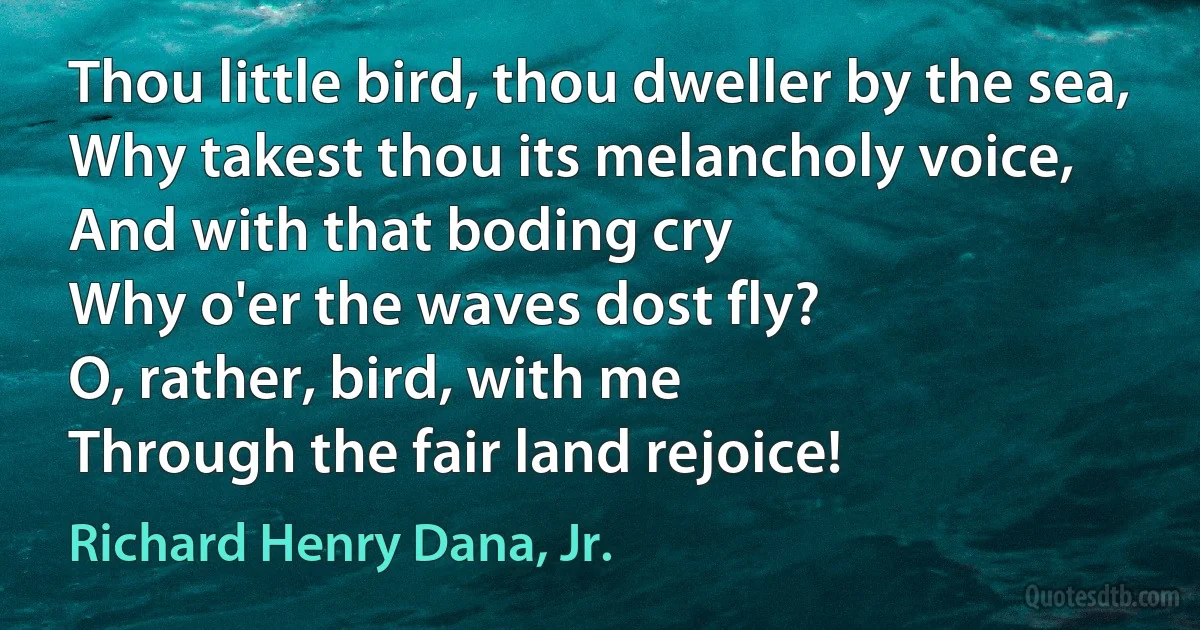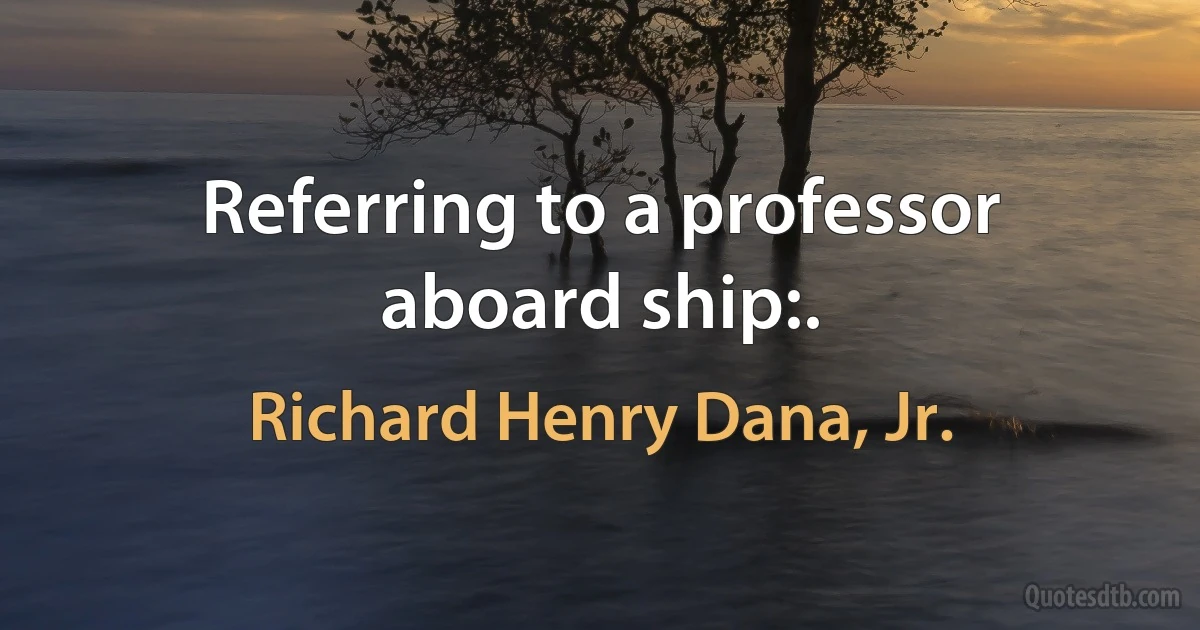Richard Henry Dana, Jr. quotes
An overstrained sense of manliness is the characteristic of seafaring men. This often gives an appearance of want of feeling, and even of cruelty. From this, if a man comes within an ace of breaking his neck and escapes, it is made a joke of; and no notice must be taken of a bruise or cut; and expression of pity, or any show of attention, would look sisterly, and unbecoming a man who has to face the rough and tumble of such a life. From this cause, too, the sick are neglected at sea, and, whatever sailors may be ashore, a sick man finds little sympathy or attention, forward or aft. A man, too, can have nothing peculiar or sacred on board ship; for all the nicer feelings they take pride in disregarding, both in themselves and others. A "thin-skinned" man could hardly live on shipboard. One would be torn raw unless he had the hide of an ox.

Richard Henry Dana, Jr.
Tuesday, January 13, 1835: We made the land at Point Conception... the point of Santa Barbara, to which we were bound, lying about fifty miles to the southeast of this point, we continued sailing down the coast during the day and the following night, and on the next morning.
On the whole coast of California there was not a lighthouse, a beacon, or a buoy, and the charts were made up from old and disconnected surveys by British, Russian, and Mexican voyagers. Birds of prey and passage swooped and dived about us, wild beasts ranged through the oak groves... herds of deer came to the water's edge.

Richard Henry Dana, Jr.
As we made the high point off San Diego, Point Loma, we were greeted by the cheering presence of a lighthouse. As we swept round it in the early morning, there, before us, lay the little harbor of San Diego, its low spit of sand, where the water runs so deep; the opposite flats, where the Alert grounded in starting for home; the low hills, without trees, and almost without brush; the quiet little beach; but the chief objects, the hide houses, my eye looked for in vain. They were gone, all, and left no mark behind. I wished to be alone, so I let the other passengers go up to the town, and was quietly pulled ashore in a boat, and left to myself. The recollections and the emotions were all sad... and only sad.

Richard Henry Dana, Jr.
Passing round Point Conception, and steering easterly, we opened the islands that form, with the mainland, the canal of Santa Barbara. There they are, Santa Cruz and Santa Rosa, and there is the beautiful point, Santa Buenaventura; and there lies Santa Barbara on its plain, with its amphitheater of high hills and distant mountains. There is the old white mission with its belfries, and there the town, with its one-story adobe houses, with here and there a two-story wooden house of later build; yet little is it altered - the same repose in the golden sunlight and glorious climate, sheltered by its hills; and then, more remindful than anything else, there roars and tumbles upon the beach the same grand surf of the great Pacific... the same bright-blue ocean, and the surf making just the same monotonous, melancholy roar, and the same dreamy town.

Richard Henry Dana, Jr.
If the women but have little virtue, the jealousy of their husbands is extreme, and their revenge deadly and almost certain. A few inches of cold steel have been the punishment of many an unwary man, who has been guilty, perhaps, of nothing more than indiscretion. The difficulties of the attempt [to copulate with a married woman] are numerous, and the consequences of discovery fatal, in the better classes. With the unmarried women, too, great watchfulness is used. The main object of the parents is to marry their daughters well, and to this a fair name is necessary. The sharp eyes of a duena, and the ready weapons to a father or brother, are a protection which the characters of most of them - men and women - render by no means useless; for the very men who would lay down their lives to avenge the dishonor of their own family would risk the same lives to complete the dishonor of another.

Richard Henry Dana, Jr.
On the morning of January 11th, 1860, I passed, for the eighth time, through the Golden Gate... As the shores of California faded in the distance, and the summits of the Coast Range sank under the blue horizon, I bade farewell - yes, I do not doubt, forever - to those scenes which, however changed or unchanged, must always posses an ineffable interest for me.

Richard Henry Dana, Jr.
We bore round the point toward the old anchoring ground of the hide ships, and there, covering the sand hills and the valleys... flickering all over with the lamps of its streets and houses, lay a city of one hundred thousand inhabitants. The dock into which we drew, and the streets about it, were densely crowded with express wagons and handcarts... Though this crowd I made my way, along the well-built and well-light streets, as alive as by day, where boys in high-keyed voices where already crying the latest New York papers. When I awoke in the morning, and looked from my windows over the city of San Francisco, with its storehouses, towers, and steeples; its courthouses, theaters, and hospitals, its daily journals, its well-filled learned professions, its fortresses and lighthouses; its wharves and harbor... when I saw all these things, and reflected on what I once saw here, and what now surrounded me, I could scarcely keep my hold on reality at all, or the genuineness of anything.

Richard Henry Dana, Jr.
I shall never forget the impression which our first landing on the beach of California make upon me. The sun had just gone down; it was getting dusky; the damp night wind was beginning to blow, and the heavy swell of the Pacific was setting in, and breaking in loud and high "combers" on the beach... we put our oars in the boat, and, leaving one to watch it, walked about the beach to see what we could of the place. The beach is nearly a mile in length between the two points, and of smooth sand... It was growing dark, so that we could just distinguish the dim outlines of the two vessels in the offing; and the great seas were rolling in in regular lines, growing larger and larger as they approached the shore, and hanging over the beach upon which they were to break, when their tops would curl over and turn white with foam, and, being at one extreme of the line, break rapidly to the other, as a child's long card house falls when a card is knocked down at one end.

Richard Henry Dana, Jr.
It had been the winter of 1835-6 that the ship, Alert, in her voyage for hides on the remote and almost unknown coast of California, floated into the vast solitude of the bay of San Francisco. All around was the stillness of nature. One vessel, a Russian, lay at anchor there, but during our whole stay not a sail came or went. Our trade was with remote missions, which sent hides to us in launches manned by their Indians... Over a region far beyond our sight there was no other human habitations, expect that an enterprising Yankee, years in advance of his time, had put up, on the rising ground above the landing, a shanty of rough boards, where he carried on a very small retail trade between the hide ships and the Indians. On the evening of Saturday, the thirteenth of August, 1859 (I again sailed into) the entrance to San Francisco, (now) the great center of worldwide commerce.

Richard Henry Dana, Jr.


